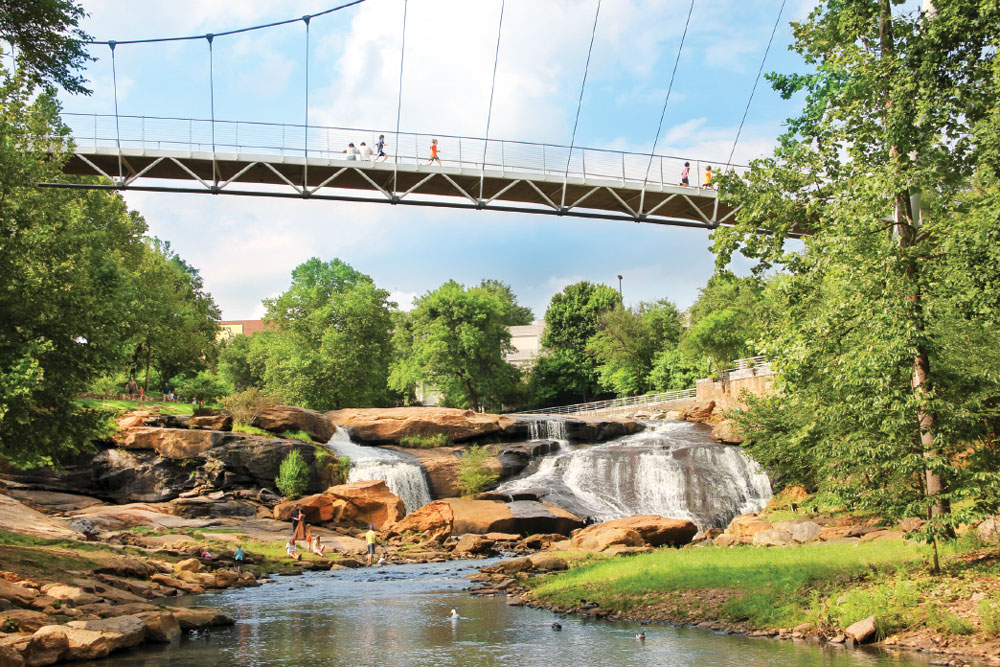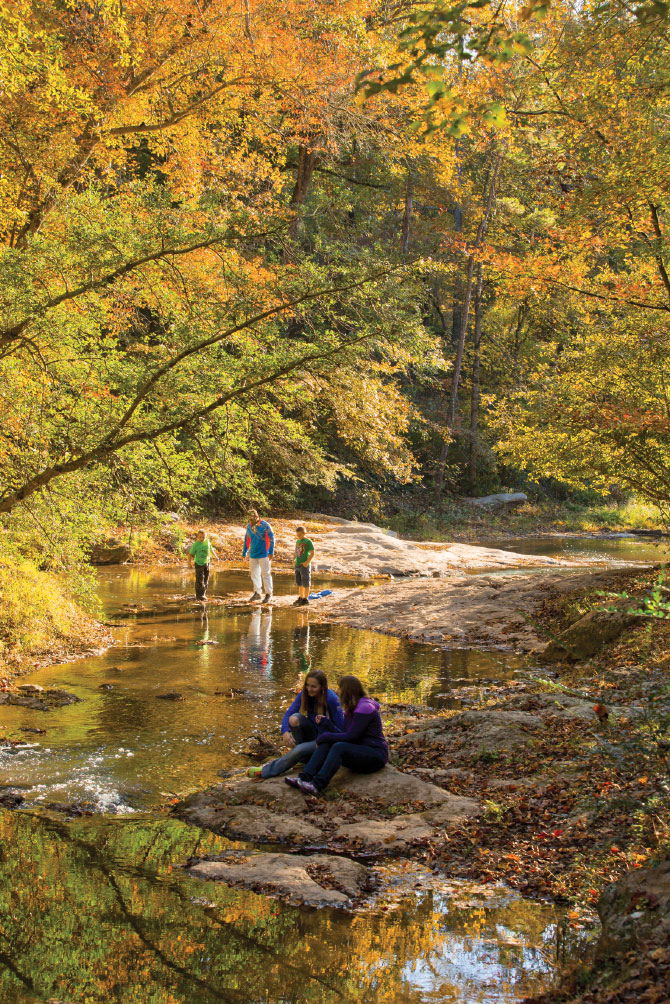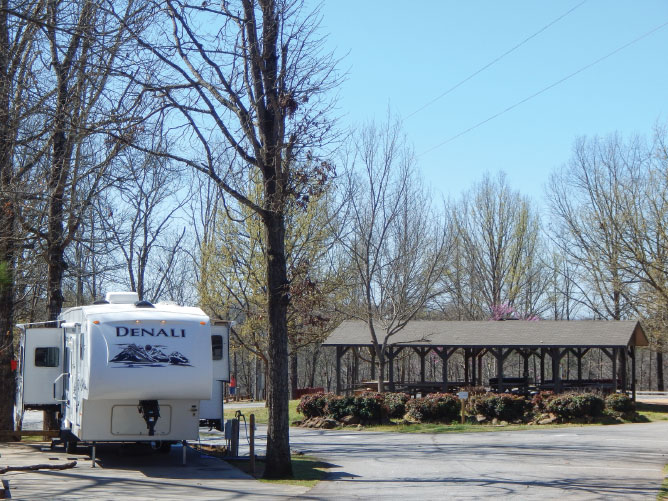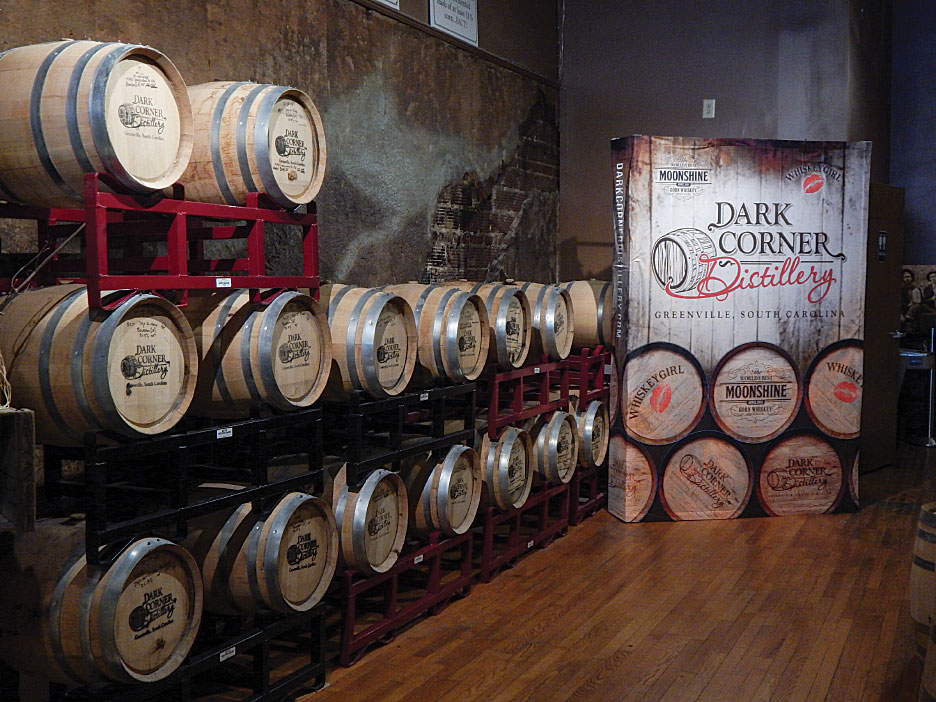Step up to the plate for two major-league museums, just 66 miles apart in Georgia and South Carolina
In a little more than an hour’s drive, baseball fans can visit the museums and gravesites of two of the most extraordinary and controversial players in the sport’s history. Mystique and notoriety are synonymous with Tyrus “Ty” Cobb and “Shoeless” Joe Jackson. The men were contemporaries who starred in the early 20th century, long before incessant ESPN coverage analyzing athletes ad nauseam. So it’s left to their respective little museums to rehabilitate the reputations of Cobb, widely portrayed as a ruthless and racist crank, and Jackson, banished for life from Major League Baseball for purportedly conspiring to throw the 1919 World Series.
Both museums can be seen in one day. The Ty Cobb Museum in Royston, Georgia, is a 90-minute drive northeast of Atlanta. The Shoeless Joe Jackson Museum in Greenville, South Carolina, is the same distance heading northwest of Columbia, and a bit farther from Charlotte. The museums are less than 70 miles from each other.
Ty Cobb Museum
It’s a straight shot up Interstate 85 from Atlanta to the Royston exit, then a 15-mile drive past rolling countryside, poultry warehouses and humble homes. With a population approaching 2,600, Royston likely has fewer people than chickens. This is where Ty Cobb, nicknamed “the Georgia Peach,” grew up.
Cobb honed his baseball skills playing for local teams before turning pro. He went on to play 24 seasons, getting more hits than anybody until Pete Rose passed him. Cobb, however, compiled the highest lifetime batting average of any player in history. The famously aggressive base runner was elected to the Baseball Hall of Fame’s inaugural class in 1936, getting more votes than Babe Ruth.

In Greenville, Falls Park on the Reedy welcomes the public to enjoy nature, trails, outdoor art and the waterfall view from Liberty Bridge.
The Ty Cobb Museum is housed inside an office building. A receptionist tells me that between three and 10 people typically visit on a weekday. A 14-minute film provides an overview of Cobb’s life and career. Curiously, the narrator says that Cobb, at age 18, had to cope with the murder of his father at his own home — neglecting to mention that it was Cobb’s mother who shot him. She was charged with manslaughter but said she mistook her husband for an intruder and was acquitted at trial. That aside, it is a treat to see old footage of Cobb and hear him speak briefly in an interview he gave a year before he died in which he discussed the unusual split-grip he used to swing a baseball bat.
Many of the most despicable qualities attributed to Cobb, such as being a racist, have been debunked over the years, most recently by Charles Leerhsen in his biography Ty Cobb: A Terrible Beauty. Still, he was a nasty hothead who fought other players, a grocer and a hotel night watchman. He even pummeled a heckler with no hands. Those qualities are lightly touched upon or ignored by the museum. More common are exhibit captions such as “considered by many to be the smartest man to play the game” and “regarded as a genius on the base path.”
The museum has some fine photos of Cobb and his baseball contemporaries in their baggy, wool-flannel uniforms. Life-size cutouts depicting Cobb in action give a real sense of his style of play.
A few of Cobb’s personal and professional items are displayed. These include trophies and awards, one of his uniforms, a timeworn bible given to him by his mother and one of his antiquated gloves that even a Little Leaguer would disdain today. Cobb’s shotgun is also here, and photos of him hunting.
The museum devotes space to his philanthropic deeds — a still-active scholarship fund that has given more than $15 million to eligible Georgia undergraduate students, and a $100,000 donation for construction of a hospital in Royston. Thanks to smart investments, especially in Coca-Cola, Cobb was a millionaire by the time he retired from baseball.
The museum still shows Cobb’s lifetime batting average as being .367, but archival research reduced it to .366. The gift shop sells items such as Cobb bobbleheads, books and caps.
A couple of miles away is the cemetery where Cobb is at rest in a prominent mausoleum. He died in 1961 at age 74. Graves of many famous ballplayers are bestowed with offerings from fans — balls, gloves, baseball cards and the like. The day I visited Cobb’s tomb, there was a Pete Rose button, a new baseball and a small photo of a sliding Cobb. That’s all.

Fluor Field, across the street from the Jackson museum in Greenville, is home to a minor-league farm club of the Boston Red Sox.
Shoeless Joe Jackson Museum
Like Cobb, Shoeless Joe Jackson was an outfielder. The Chicago White Sox team on which he played in 1919 lost to Cincinnati in the World Series. Jackson and seven teammates were accused of accepting money from gamblers in return for deliberately losing. The scandal was the subject of the book and movie Eight Men Out. The players were acquitted in court but exiled from Major League Baseball for life. Jackson’s career was finished at the age of 32.
Nearly a century later, debate continues as to whether Jackson got a bum deal. He did, after all, hit a robust .375 in the series — the highest of anybody on either team. He also belted the only home run in the series. The Shoeless Joe Jackson Museum comes down on the side of his innocence. It used to collect visitors’ signatures on a petition asking the commissioner of Major League Baseball to remove Jackson from its ineligible list and clear the way for him to be elected to the Hall of Fame. The request was denied last year.

In autumn a canopy of gold, orange and red leaves colors the trails that ribbon through Royston’s Victoria Bryant State Park.
photo courtesy of Explore Georgia
There are few original artifacts in the museum, but lots of old newspaper stories and nicely staged photos. One of my favorites was of the teenage Jackson and his older teammates on a local textile-mill team with faces hardened and weary from toiling at grueling jobs. There is a photo of Jackson and his bride on their wedding day, images of Jackson in action and with contemporaries, including Cobb, as well as pictures of him later in life when he looked older than his years.
All of this is crammed into the five-room, 950-square-foot house that was home to Jackson and his wife, Katie. What had been a small screened porch is now a library stuffed with hundreds of donated baseball books. On a living room chair is a replica of Jackson’s bat, which he called Black Betsy. A small gift shop has T-shirts, postcards and specially made poker chips with images of Jackson.
The house itself is a throwback with its original pine floors, tiny bathroom and vintage kitchen with a linoleum floor and counters so low that a young child could reach them. It’s a reminder that baseball players once earned modest salaries. Today, the Major League Baseball minimum salary is more than $.5 million a year, and the average wage, according to a 2016 Associated Press study, is $4.38 million.
Jackson grew up in Greenville, working as a kid in textile mills. He quit school early and never learned to read or write. He signed a professional contract when he was 20, and hit .408 in his rookie season two years later. That’s the highest batting average ever by a rookie. Jackson’s .356 career average was topped only by Cobb and Rogers Hornsby at .358.
When his baseball career ended abruptly, Jackson and his wife moved to Savannah and operated a dry-cleaning business. They later returned to Greenville, and he opened a barbecue restaurant, then a liquor store.
Jackson died of a heart attack in this home in 1951. He was 64. Largely through the efforts of Arlene Marcley, Jackson’s home eventually was moved 3 miles to its current spot and opened as a museum in 2008. Marcley and her husband run the place.

Grand Slam
Ty Cobb Museum
The museum is in a one-story building at 461 Cook Street in Royston, Georgia, and is open from 9 a.m. to 4 p.m. on weekdays and 10 a.m. to 4 p.m. on Saturdays.
Admission for adults is $5, $4 for seniors, $3 for students, and active military and under age five are free.
706-245-1825, www.tycobbmuseum.org
Shoeless Joe Jackson Museum
Located at 356 Field Street in Greenville, South Carolina, in Jackson’s old house, the volunteer-staffed museum is open from 10 a.m. to 2 p.m. on Saturdays and on weekdays by appointment (send email requests to [email protected]). Admission is free.
864-346-4867, www.shoelessjoejackson.org
From Jackson’s home and museum, it’s a short walk to the statue of him erected in 2002. The man who Cobb described as “the best natural hitter I’ve ever seen” has just completed a swing, eyes watching the trajectory of the ball, his glove stuffed in a hip pocket.
From there I drive to the cemetery where Jackson and his wife are buried. A flat, bronze marker tops the grave. What distinguishes it from others are the coins scattered around it, the three-dozen baseballs placed by fans, a ceramic child’s baseball glove with a ball in it, several pairs of socks, a tennis shoe and a boot. Shoeless Joe was shoeless no more.
If you time it right, you can combine a visit to Shoeless Joe’s museum and grave with a Class A Greenville Drive baseball game at Fluor Field. The handsome brick stadium stands across the street from the museum. It’s a 10-year-old gem with lively bars and restaurants nearby.
The Drive is a farm club of the Boston Red Sox, and Fluor Field features a mini version of Fenway Park’s famous Green Monster, the 37-foot-high wall in left field. Fluor Field’s version is 30 feet tall, and the ballpark’s outfield dimensions mimic those of Fenway. There’s even a quick burst of fireworks after the team wins. You can’t help but think that Shoeless Joe would have loved it all.
In the Outfield
Caesars Head State Park
About 37 miles north of Greenville, this public park in Cleveland, South Carolina, delivers panoramic views and more than 7,400 acres of wilderness that includes 34 miles of hiking trails and scenic waterfalls. With a South Carolina fishing license, trout fishing is permitted in the Saluda River and a couple of creeks.
864-836-3081 | www.southcarolinaparks.com/caesarshead
Dark Corner Distillery
A craft micro-distillery in downtown Greenville, Dark Corner produces small batches of aged whiskey, gin and absinthe, but mostly whiskey, in a 1925 building — it still has the original floors. Hours are Monday through Saturday from noon until 6 p.m. Tastings are offered, and a gift shop sells moonshine-infused foods, pantry goods and local crafts.
864-631-1144 | www.darkcornerdistillery.com
Falls Park on the Reedy
A 32-acre nature trail and gardens near downtown Greenville, this peaceful oasis sprawls across land once occupied by textile mills. A 355-foot suspension bridge over the Reedy River provides bird’s-eye views of the park and a waterfall.
864-232-2273 | www.fallspark.com
Greenville Zoo
Cleveland Park’s 14-acre zoo exhibits lions, leopards and sea lions, among other critters. One of the newest additions is a giraffe born earlier this year.
864-467-4300 | www.greenvillezoo.com
Lake Hartwell
At the Georgia and South Carolina line getween Royston and Greenville, this man-made lake draws boaters, swimmers and fishing enthusiasts, and is surrounded by hiking and bicycling trails. The visitor center is at 5625 Anderson Highway (U.S. Route 29) in Hartwell, Georgia.
888-893-0678 | www.southcarolinaparks.com/lakehartwell
Home Plate
GEORGIA
Commerce
Twenty-six miles west of Royston, Georgia RV Park accommodates RVs with 30- and 50-amp electrical service, water, sewer, Wi-Fi and cable. The park is pet-friendly and has a saltwater pool, a laundry room, a playground and a picnic pavilion.
706-335-5535 | www.georgiarvpark.com
Royston
The 502-acre Victoria Bryant State Park has 27 sites with water and 30-amp electrical service for RVs up to 40 feet. Two comfort stations provide hot showers, flush toilets, and a washer and dryer. The public park is pet-friendly and has two fishing ponds, a swimming pool, nature trails and an 18-hole golf course.
706-245-6270 | www.n-georgia.com/victoria-bryant-state-park.html

The small campground at Royston’s Victoria Bryant State Park has RV sites a few minutes from the Ty Cobb Museum.
SOUTH CAROLINA
Anderson
Nestled in the foothills of the Blue Ridge Mountains, Lake Hartwell Camping and Cabins is about 30 miles from Greenville and 36 miles from Royston. Eighty pull-through sites have full hookups and fire rings. Guests can fish from the dock or shore and hike among
35 acres of trails.
888-427-8935 | www.camplakehartwell.com
Fair Play
A pet-friendly park on Lake Hartwell, 44 miles from Greenville and 21 miles from Royston, Carolina Landing RV Resort has mostly pull-through sites with 30- and 50-amp electrical service, water hookups and some sewer hookups. The park offers showers, a laundry room, a Wi-Fi hotspot and two dump stations, as well as miniature golf and a swimming pool.
877-570-2267 | www.rvonthego.com/south-carolina/carolina-landing-rv-resort
Greenville
Springwood RV Park has 65 full-hookup sites with 30- and 50-amp electrical service, concrete patios and free Wi-Fi. The park accepts pets with some restrictions and can accommodate big rigs.
864-277-9789 | www.springwoodrvpark.com
Travelers Rest
Nine miles north of Greenville, Travelers Rest KOA has back-in and pull-through sites with full hookups, 30- and 50-amp service, Wi-Fi and cable. Pets are allowed except for pit bulls, Rottweilers and Dobermans.
800-562-5631 | www.koa.com/campgrounds/greenville


